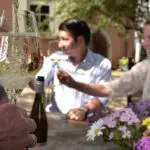Yes. And I will tell you why.

It’s not too long ago, during my time in Hong Kong, that I got approached multiple times by companies peddling the advantages of investing in wines. They meant buying wines, storing them and reselling after the price had appreciated. They meant Burgundies and Bordeaux – definitely not white wines. To some extend they were successful, and they were right, too, given the skyrocketing price developments of fine Bordeaux and Burgundy wines.
I never bought in: besides just not being rich enough I deeply disdained the idea of investing in wine for money. I’d leave that to rich ignorants and I’d drink the wines I bought. Still I had to admit that it was a nice idea to be able to just drink your stock, should prices not develop the way you fancied.
Fast forward to Germany, recent vintages: Those few ones who managed to buy a G-Max Riesling from cult producer Klaus Peter Keller (Rheinhessen) paid around 150Euro a bottle in 2014 and would now be able to sell it for 500-600Euro. KPK’s top riesling is not the only one fetching steep price increases in little time. Take for instance Egon Müller’s Schwarzberger TBA Riesling 2003 which fetched close to 15.000 Euro a bottle at an auction in 2015. Noble rot Rieslings from Prüm, Schloss Lieser, Karthäuserhof did extremely well in auctions. (Also, there is increasing attention for German Pinot Noirs as – still affordable – alternative to Burgundies and, rather sooner than later, there might be a similar hype around top pinots as there is for the Rieslings. But that’s a different story.)
So, from a financial point of view, investing might not be a bad idea. German Rieslings are gaining popularity and international attention – so with a bit of cherry (uh…grape-) picking you might be able to compile a portfolio that gains in value quickly. You would need to look for Rieslings that can age well, such as those classified as Grosse Gewächse (Grand Crus, you’ll typically find a GG embossed on the bottle) or from the sweet categories such as Auslese or Trocken Beeren Auslese. The ageing potential lies between 20-50 years – the rule of thumb is: the sweeter the longer the wines can age.
With all that said, it might be much more fun to give ‘investment’ a slightly different meaning. I’d like to see investment in Riesling as time and passion dedicated to hunting down great examples and as the patience to groom them to perfection instead of gobbling them up immediately. So, yes, you should invest in Riesling – but target your returns on your palate not on your wallet.
PS:
[should you want to invest in Klaus Peter Keller Rieslings: we can drop by on our tours ; but then there are so many other great wines along the route…]








